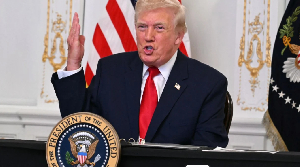This series continues our discussion on an urgent need for a “mixed economy,” which already exists in various forms across the world, and our accompanying argument that it be improved to serve the needs of our people. Granted, we have argued consistently that free-market fundamentalism and pure socialism have never existed anywhere in human history. We shall not, on the other hand, waste our time on communism because it too has never existed anywhere as an empirical expression of any polity’s political economy.
The point is that the West is wont to preach one policy theory to Africans but chooses a different set of self-serving policy theories to fit and advance its political economy. Yet Ghanaians and the larger world of Africa continue to follow blindly. Ghanaian and African leaders therefore need to circumscribe these imported delusions and come to terms with the pragmatism of ideas capable of serving their people and solving problems. We hope our leaders learn some hard lessons from this series. Having said that, the first in the series is titled “Bernie Sanders Is Not A ‘Socialist.’ That Title Belongs To George W. Bush” (Author: H.A. Goodman. Huffington Post, Aug. 27, 2015).
The article fundamentally exposes the hypocrisy of Western capitalists and their free-market fundamentalists. Our leaders should know better and approach their political economies from the standpoint of pragmatism. Read on:
“When George W. Bush signed TARP legislation on October 3, 2008, the Republican president engaged in the definition of socialism.
“In reality, true socialism combines government and tax dollars with the ownership of private industry, as indicated by the following definition from Merriam-Webster:
“Socialism: a way of organizing a society in which major industries are owned and controlled by the government rather than by individual people and companies.”
“Therefore, let's take a closer look at who called for "major industries" to be "owned" by the government, and who is working to prevent this debacle from once again taking place. Ironically, while the Wall Street bailouts began under George W. Bush, it's Bernie Sanders who's labeled a "socialist" for wanting to prevent yet another costly and devastating collapse.
“According to The New York Times, the U.S. government's "direct investments in financial institutions" totaled roughly $9 trillion by 2011, with initial "commitments" of around $12 trillion. Because of America's willingness to inject taxpayer money into struggling corporations, the U.S. government became an "investor," "insurer," and "lender" to Wall Street and other segments of the economy. Numerous corporations that were once owned by shareholders were eventually partially owned, for a brief time, by "We the People."
“After years of politicians, media and investors pumping billions into stock market and real estate bubbles, Wall Street eventually tanked and came begging for government stimulus in the form of Goldman Sachs Socialism.
“George W. Bush, not Bernie Sanders, is the real "socialist" of our generation, primarily because the economy collapsed under his tenure and as a result, the conservative president began an ongoing program of government stimulus into various industries. The 2008 financial collapse resulted in $29 trillion of federal bailout commitments, the partial nationalization of nine major banks, and the "means of production" (pertaining to some of the biggest corporations on the planet) partially owned by the U.S. government. Ultimately, the financial crisis cost the U.S. over $22 trillion and we're still feeling its repercussions today. This foray into the true definition of socialism began under Bush and continued with Obama, culminating with Citigroup ensuring that a 2014 spending bill allowed for future bailouts.
“When Clinton supporter Senator Claire McCaskill says, "I very rarely read in any coverage of Bernie that he's a socialist," she also forgets to mention that Missouri banks received $641 million in TARP money.
“This is socialism.
“Not only do people confuse the definition of socialism, but they've also ignored the definition of hypocrisy.
“It seems that everyone from Senator McCaskill and Chris Matthews to people like Bill O'Reilly don't understand that modern American socialism begins with Bush signing TARP legislation on October 3, 2008. After George W. Bush signed this legislation, the U.S. government not only controlled certain Wall Street corporations that used to be controlled by shareholders, but Bush's decision also paved the way for bailing out the automotive industry. In 2008, a Republican administration prevented the free market from drowning in debt and government stimulus was the life preserver.
“While Republicans and Clinton supporters attack Bernie Sanders for being a "socialist," they conveniently forget that Vermont's Senator voted against the Wall Street bailouts. Sanders also predicted the eventual economic catastrophe in 1999, when he voted against the repeal of the Glass-Steagall Act. He again echoed these same fears in 2003, when he blasted Alan Greenspan for Wall Street's excesses and America's growing wealth inequality.
“In reality, the "socialist" from Vermont voted against the partial nationalization of banks and corporations in 2008. Conversely, a Republican president initiated the $700 billion bailout bill, and President Obama continued with the rescue of Wall Street.
“In American politics, it's the free market enthusiasts who've willingly accepted the partial nationalization of corporations while simultaneously fighting any regulations that could have prevented this catastrophe. Those who oppose such recklessness are labeled as either socialists, or anti-business.
“In 1999, when Sanders voted against the repeal of the Glass-Steagall Act, he can be seen in this video of his speech to Congress accurately predicting the eventual 2008 collapse. Unlike Hillary Clinton, Sanders favors a renewed Glass-Steagall Act and vows to break up the "Too Big To Fail" banks that were partially nationalized by the federal government. Ironically, even though he's fought to prevent government control of industry, Sanders is considered a socialist by the same people who eagerly bailed out these institutions.
“Like his vote against the Iraq War (where he predicted the dire consequences of removing Saddam Hussein and America engaging in the largest counterinsurgency war since Vietnam), Sanders foreshadowed an economic breakdown because he was able to see the writing on the wall. Jeb Bush, Hillary Clinton, and every other candidate in 2016 didn't have the wisdom or foresight to warn against the impending catastrophe. As with Iraq, Sanders was on the right side of history.
“True, the Vermont Senator uses the phrase "democratic-socialist." However, that wording has an entirely different meaning from the political attack leveled against him by Senator Claire McCaskill and others. Conservative talk show hosts might equate free public college tuition with Stalin's gulags, or single-payer healthcare to Trotsky’s ghost, but these policy objectives are no more linked to socialism than the Social Security checks cashed by the average Tea Party member.
“After close to eight years of Republicans accusing President Obama of being a socialist (and far more egregious terms), it's striking that certain Democrats would accuse Bernie Sanders in the same manner when he's clearly stated the words, "democratic-socialist." Even then, within the context of its meaning, Sanders would be considered a staunch capitalist to democratic-socialists in Europe. Also, to many Republicans, all Democrats are socialists, so the phrase has lost its sting after years of overuse.
“Furthermore, Democrats have two choices in 2016. Bernie Sanders offers voters a genuine change from Republicans and mainstream Democrats when it comes to politicians catering to the "billionaire class." Or, there's Hillary Clinton's well-publicized ties to Wall Street and various investment banks. According to a POLITICO article titled "Why Wall Street Loves Hillary Clinton," the former Secretary of State's allegiance to big banks is something voters should take into account in 2016:
"I love watching Elizabeth give it to those who deserve it," Clinton said to cheers. But then, awkwardly, she appeared to try to out-Warren Warren--and perhaps build a bridge too far to the left--by uttering words she clearly did not believe...
But here's the strange thing: Down on Wall Street they don't believe it for a minute. While the finance industry does genuinely hate Warren, the big bankers love Clinton, and by and large they badly want her to be president.
“To them, she's someone who gets the idea that we all benefit if Wall Street and American business thrive. What about her forays into fiery rhetoric? They dismiss it quickly as political maneuvers. None of them think she really means her populism.
“According to a wide assortment of bankers and hedge-fund managers I spoke to for this article, Clinton's rock-solid support on Wall Street is not anything that can be dislodged based on a few seemingly off-the-cuff comments in Boston calculated to protect her left flank.
“So, according to this POLITICO article, "the big bankers love Clinton" and "they badly want her to be president." This correlates to the fact that four of Clinton's top five donors since 1999 are Citigroup, Goldman Sachs, JP Morgan, and Morgan Stanley. Since 1999, these firms have helped Clinton raise $376, 309,659, therefore it's safe to say that if one or all of them risk bankruptcy, Hillary Clinton and others would come to their defense, arguing that a one-time foray into socialism (in the form of a bailout) is needed to prevent an economic collapse.
“Bernie Sanders isn't a "socialist." Those who'd eagerly inject billions of federal dollars into failed corporations are infinitely more "socialist" than the Vermont Senator. Furthermore, Vox has a wonderful conversation with Senator Bernie Sanders (where he explains the meaning of "democratic-socialist") that naysayers should watch, lest they continue their ignorant claims against Vermont's Senator.
“In reality, the heart of the Democratic Party has always been full of democratic-socialists, and FDR is a prime example. In 2016, Bernie Sanders could be our next democratic-socialist in the White House, which ironically would be a greater step away from the costly Goldman Sachs Socialism adopted by the Bush administration.”
SOURCE:
http://www.huffingtonpost.com/h-a-goodman/bernie-sanders-is-not-a-socialist_b_8047266.html
Opinions of Tuesday, 1 September 2015
Columnist: Kwarteng, Francis














